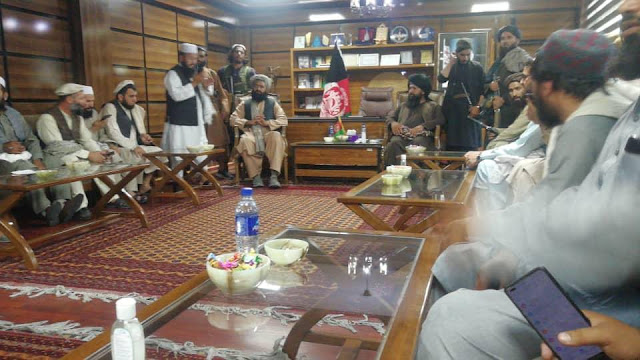 |
| Taliban occupation: What is happening in Afghanistan and what is going to happen next? |
Taliban occupation: What is happening in Afghanistan and what is going to happen next?
The Taliban seized power in Afghanistan on August 15, two weeks before the full withdrawal of US troops after a two-decade-long war.
Taliban fighters stormed all over Afghanistan and captured all major cities in a matter of days, while the US and its allies' trained and armed Afghan security forces could do nothing.
An overview of what we know about the current situation in Afghanistan and what is going to happen next is given in the following report:
What is happening in Afghanistan?
The Taliban, the militant group that ruled Afghanistan in the late 1990s, has regained power.
The US-led invasion of Afghanistan in 2001 overthrew the Taliban, but they never left the country.
In recent days, as the Taliban sought to take over the country, the Western-backed government, which had ruled the country for 20 years, came to an end.
At the moment, Afghans are scared of their future and are rushing to the airport, which is the only way out of the country.
Why are people fleeing the country?
He worries that the country could fall into disarray or that the Taliban could retaliate against those who worked with the Americans or the government.
Many also fear that the Taliban will re-impose a strict Islamic system, which they relied on during their rule in Afghanistan from 1996 to 2001.
At the time, women were barred from going to school or working outside the home, had to wear a burqa, and had a male relative with them whenever they wanted to go out.
The Taliban banned music, cut off the hands of thieves and stoned adulterers.
In recent years, the Taliban have sought to present themselves as a more moderate force and say they will not retaliate, but many Afghans are skeptical of those promises.
Why are the Taliban now in power?
Probably because US troops are fully prepared to withdraw from Afghanistan by the end of this month.
The United States has been trying to pull out of its longest-running war, Afghanistan, for years.
The United States ousted the Taliban government as a result of sheltering them a few months after the 9/11 attacks.
However, it proved more difficult to rebuild a nation affected by repeated wars and to occupy Afghan territory.
As US attention shifted to Iraq, the Taliban began to regroup and took control of much of rural Afghanistan in recent years.
Last year, then-US President Donald Trump announced his withdrawal from Afghanistan, signing an agreement with the Taliban and limiting US military action against them.
After which the current US President Joe Biden announced that his troops would leave Afghanistan by the end of August.
As the deadline for the US withdrawal approached, the Taliban began occupying cities rapidly.
Why did the Afghan security forces succumb to the Taliban?
The short answer is corruption.
The United States and its NATO allies have spent billions of dollars training and equipping Afghan security forces for two decades, but the Western-backed government has been plagued by corruption.
The commanders exaggerated the number of troops to snatch resources, while the troops on the ground often lacked ammunition, equipment or food.
In recent days, as the Taliban made rapid progress, entire units surrendered after brief battles, while Kabul and some nearby provinces fell to the Taliban without a fight.
What happened to the President of Afghanistan?
Afghan President Ashraf Ghani left the country on August 15.
When the Taliban took over the country, President Ashraf Ghani gave up and made some public statements.
When the Taliban arrived in the capital on August 15, they left Afghanistan and later said they chose to leave the country to avoid further bloodshed.
However, it is not clear where Ashraf Ghani has gone.
Why are people comparing Afghanistan to defeat in Saigon?
The occupation of Saigon by North Vietnamese forces in 1975 ended the Vietnam War.
It became a lasting symbol of defeat after thousands of American citizens and Vietnamese allies were flown out of the city by helicopter.
However, US Secretary of State Anthony Blinken dismissed the comparison with Afghanistan, saying "this is not Saigon."
What will happen in Afghanistan now?
It is not clear what is going to happen in Afghanistan now.
The Taliban say they want to form a "comprehensive, Islamic government" with other groups, and are negotiating with senior politicians, including former government leaders.
He has vowed to enforce Islamic law but said he would provide a safe environment to restore normalcy after decades of war.
But most Afghans distrust the Taliban and fear their government will be violent and oppressive.
One thing that is bothering people is that the Taliban want to rename the country the Islamic Emirate of Afghanistan, which they used to call during their rule.
What does Taliban occupation mean for women?
Many fear that the Taliban's takeover could mean the loss of the many rights.
Afghan women have achieved tons since the Taliban was ousted.
Most women are worried that they're going to once more be confined to their homes, but the Taliban have said they're not against women's schooling, but haven't developed a transparent policy on women's rights.
Afghanistan has been a really conservative country, and even under the Taliban, the status of girls has often been different.
Will the Taliban harbor al-Qaeda again?
It may be anyone's guess, but US military officials are concerned.
In a peace deal reached last year, the Taliban promised to fight terrorism and stop Afghanistan from becoming a base for renewed attacks, but the us could implement it on alittle scale.
Advances in technology over the past 20 years have allowed the us to focus on suspected militants in countries like Yemen and Somalia, where its military isn't permanently stationed.
The Taliban have paid an important price for his or her role within the 9/11 attacks and are likely to avoid repeating it as they seek to strengthen their rule.
Earlier this year, however, senior Pentagon officials said extremist groups like al-Qaeda could re-emerge in Afghanistan, and that they are now warning that such groups could grow faster than expected.
There also are ISIS-affiliated groups in Afghanistan that have administered horrific attacks in recent years targeting its Shiite minority.
The Taliban have also condemned such attacks and therefore the two groups have fought one another over the region, but it remains to be seen whether the Taliban government are going to be willing or ready to suppress ISIS.

Comments
Post a Comment